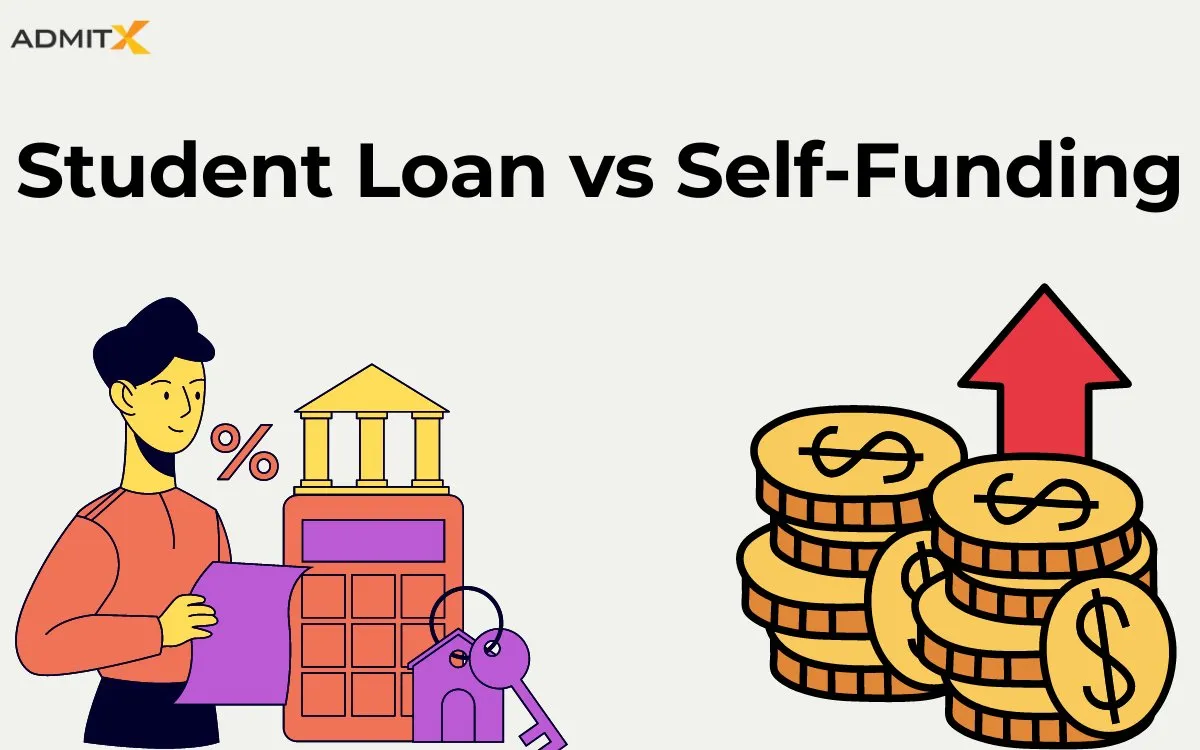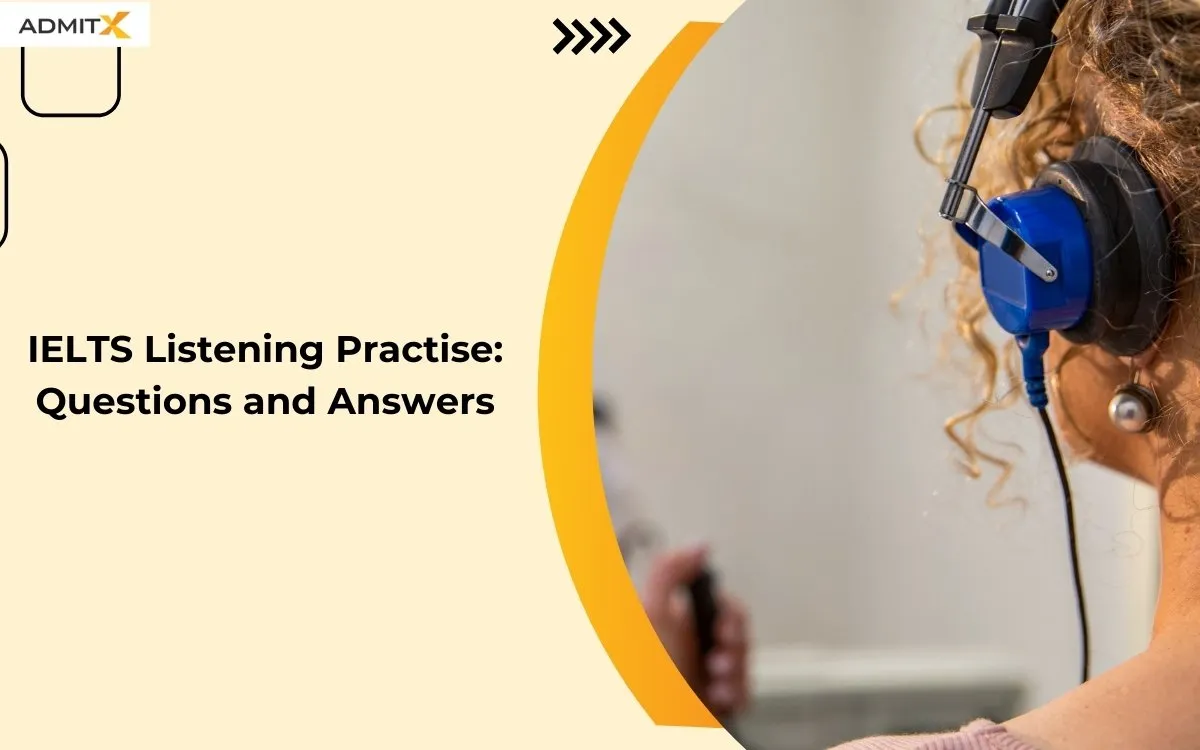
Student Loan vs Self-Funding: Detailed Comparison and Analysis
While preparing to go for study abroad, students need financial assistance to afford their education and other expenses. In this case, they have several options to pursue, like getting a student loan or asking their parents to finance their education, wholly or partially. However, they also face many difficulties in selecting the appropriate form of funding options.
In this blog, we have provided complete details on both types of funding options- student loan and self-funding, including their differences, features and tips for self-financing the course.
Student Loan vs Self-Funding: Introduction
Due to the increasing awareness of studying abroad, the demand for admission to courses and top foreign universities also increased. Since it is hard to afford study programs without any support, there are two major sources available to students for funding: student loans and self-financing. A student loan or an education loan is the amount of capital that lenders such as banks, NBFCs and other financial institutions offer. Self-funding is the practice of affording their education through other sources such as their savings, requesting financial help from relatives, friends or family, scholarships, securing money from third parties, etc.
Advantages & Disadvantages of Student Loans for Studying Abroad
Below, we have mentioned the advantages and disadvantages of education loans, which students must understand before applying for the same:
Advantages of Education Loan
- Covers all expenses: A student loan for studying abroad can cover a wide range of costs such as tuition fees, accommodation, travel, books, and other educational costs, ensuring comprehensive financial support.
- Positive CIBIL Score: Taking an education loan and timely repayment can help students build a positive credit history earlier in their starting age of professional pursuits. It facilitates them to make other financial endeavours in future.
- Develops Character and Good Habits: Affording an education loan can make a student more responsible and caring in their financial investments and transactions. It creates good habits of budgeting and using financial analytical skills in making larger transactions.
- Develops Value of Finances: Repayment of student loans for studying abroad can be made through EMIs in a consistent manner, which can affect the credit score of the student. This makes the student more conscious about their expenditure on relevant goods and services.
- Lower Interest Rates: Education loan is offered at comparatively lower interest rates than other types of loans. Hence, they facilitate the student to pursue their dreams of studying abroad.
Disadvantages of Education Loan
- Debt Pressure: An education loan is a kind of debt that needs to be repaid on time; otherwise, the borrower faces several consequences, such as selling off their security by the lender, negative credit history and lack of trustworthiness in financial institutions for future endeavours.
- Affects Financial Planning: Repayment of the student loan can hamper the financial situation for an extended period since it involves budgeting, and most of the part of capital earned through employment is used to repay the loan.
- Mismanagement in Repayment: The repayment of the loan can be made once after student gets employment. However, in some cases, the income earned through a particular job may not be sufficient to repay the loan amount, which leads them to pursue side employment or overtime to earn more.
Advantages & Disadvantages of Self-Funding
Below, we have mentioned the pros and cons of self-financing education, which students must understand before going for the same:
Advantages of Self-Funding
- Promotes Open Communication: Taking the option of self-funding education can leverage family support. It enhances the communication between parents and students, which ultimately boosts the confidence of the child even before going abroad for studies.
- Value of Savings: It helps students to understand the value of hard work and patience that their family has made to earn capital, which is now what they are spending on/financing their education.
- Explore Part-Time Work: Self-funding often stimulates students to search for part-time work opportunities in abroad country while pursuing their studies.
- No worry about Repayment: Self-funding allows students to focus on their studies because it facilitates them to think about their aims and dreams rather than thoughts of repaying the loan.
- No Debt Pressure: Self-financing allows students to become independent and free from any type of anxiety that often comes up when the time of repayment of the loan is about to start. It reduces the debt burden on them.
Disadvantages of Self-Funding
- Insufficient Capital: One of the biggest challenges while self-financing education is that the capital may not be enough to meet the requirements for the whole duration of the academic program.
- Dealy in Arrangement: Arrangements for self-funding education might be delayed due to various factors, which can ultimately affect the whole timeline of the student preparing to go abroad country for education.
- Risk on ROI: Self-funding involves with risk of depletion of whole savings if the desired ROI is not made.
Types of Student Loans for Studying Abroad
There are two types of education loans available in India. Below, we have discussed the types of education loans for abroad studies:
Collateral Education Loans
A collateral education loan or secured education loan is the type of education loan that requires the student to lend the following types of collateral to a lender:
- Property (house, flat, land, or agricultural land)
- Deposits (fixed deposits, recurring deposits, or any other type of deposit)
- Securities (debentures, bonds, equity shares)
Non-Collateral Education Loans
Non-collateral education loans or unsecured education loans don’t require students to lend any security or collateral to a lender. Financial institutions provide this type of education loan by considering the profile of the co-applicant or co-signer.
| Aspect | Collateral Loan | Non-Collateral Loan |
|---|---|---|
| Collateral | Requires some assets like property or deposits | Doesn’t require pledging any type of asset |
| Loan Amount | Offers higher loan amounts due to the presence of security | Provides loans at a lower maximum limit |
| Interest Rate | Lower interest rates | Higher interest rates |
| Approval Process | Complex process since it involves the evaluation of the assets | Faster processing and approval |
Also read – Ways to Fund your Overseas Education
Student Loan vs Self-Funding: A Tabulated Comparison
Below, we have shortened our discussion on the pros and cons of both student loans and self-funding to a more comprehensive and general comparison in tabulated form:
| Factors | Student Loans | Self-Funding |
|---|---|---|
| Proof of Funds - Requirement of Solvency letter by university | The lender provides a solvency letter as proof of finances | Student have to manage on their own to showcase to the university their capacity to afford education |
| Arrangement of Large Funds | The lender disburses the required funds to the university over a period to cover the tuition cost of the student | Saving a large amount of money can be difficult. It can be used over some time for a whole academic duration |
| Multiple Expenses | Student loan covers a variety of academic expenses apart from the tuition fees | Saving or arranging a part of money for different purposes can be difficult for most of the students |
| CIBIL Score | Students get a positive credit score for making future financial endeavours if repayment is made on time. | CIBIL score cannot be made without transacting in official or authenticated ways. |
| Repayment of Money | Repayment is made directly to lenders or other financial institutions, thereby strengthening the credit history. | Repayment is made to family or relatives through cash or sometimes other form of payment. |
| Fluctuation in Currency Rates | It does not affect the education loans | The cost of study can fluctuate with the change in currency rate, thereby making students worried and strained |
| Monetary Advantages | Low interest rates, rebate on income tax, government subsidies, flexible repayment schedule | No monetary advantages |
Tips for Self-Funding
- Create and Maintain a Schedule: Before planning the funding schedule, research the tuition fees, cost of living and other possible expenses that might come while residing in the foreign city where the admission has been granted.
- Consult with Parents: Initiate communication with your parents and discuss with them your intentions and schedule. Be open-minded and always be ready to welcome their opinion or advice.
- Search Part-Time Work: Before moving to a foreign country, explore the part-time job opportunities that can help you financially and also build your connections and skills during your study.
- Consistency in Saving: Do not worry about how much you are saving or saved; if required, continue this practice to collect enough capital to afford your education.
- Explore Scholarships Opportunities: Research and explore the potential scholarship schemes that universities provide, both on merit and need-based. Apart from the university, there are various private institutions like Tata Sons, Wipro, Microsoft, Reliance Foundation, etc., which provide funding opportunities for all.
Conclusion
Students often face difficulties whether to choose education loans or self-funding options for financing their higher education. Understandably, this decision involves several factors such as awareness, consensus of parents, financial background, etc. Education loan provides several monetary benefits to students, such as rebates on taxes, flexible repayment options, building a good credit score, etc., which is impossible in the self-funding process.
However, self-funding also has its advantages; it makes students more accountable to their parents and develops their moral character because, without the interference of parents/guardians, the students cannot do self-funding.
FAQs
Is it better to take education loan or self-funding options?
A student loan is mostly required for those students who do not have significant financial resources to cover their educational expenses. It bridges the gap between their aspirations and economic scarcity. Self-funding is a viable option if a student has enough savings or resources the need of academic pursuits.
Which type of education loan is best?
A collateral education loan can be the best type of education loan because it provides financial assistance at a much lower interest rate with the possibility of getting a larger loan amount up to INR 1-1.5 Crore, depending on the requirement of the student. Apart from these, it also provides flexible repayment options with longer loan tenure.
What are the sources of self-funding?
Self-funding could come from personal or family savings, fixed deposits, recurring deposits, investments made in government schemes, etc.
If you are an aspirant looking to study at your dream university, book an appointment with AdmitX today and start your applications early to avail yourself of all the benefits.








